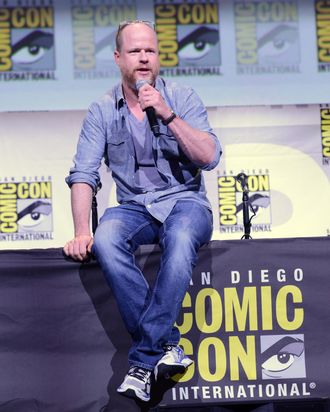
“Thank you guys for coming out to watch my nervous breakdown,” Joss Whedon said, on a platform by himself in a 7,000-seat auditorium.
How do you know Whedon’s important? You know Whedon’s important because Comic-Con gave him an hour in Hall H, the holy site of its biggest and most in-demand panels — he followed Game of Thrones and The Walking Dead — to sit on the edge of a table and answer questions from the audience. That’s it.
Nervous breakdown or not, most audience members were there to do one (or both) of these things: 1) flatter Joss Whedon, and 2) ask Joss Whedon about Buffy. It was an audience member in category number one who provided the most interesting prompt of the event.
“How does an independent filmmaker like myself encourage an audience like this to pay for my superhero film, and other independent filmmakers to encourage people to pay for stuff, so we can keep working and at the same time we can all keep making stuff?” he asked.
“I have no idea, and not because I have not been thinking about this,” Whedon said. Few filmmakers lie at the intersection of art and commerce quite like Whedon does: a prolific screenwriter, he had directed just one feature film when Marvel deputized him to write and direct The Avengers and Avengers: Age of Ultron, which became two of the seven highest-grossing movies of all time.
First, he diagnosed the problem at the core of the question, a diagnosis that implicates both studios and audiences:
It’s gotten to a state where movie studios are pretty relentless about trying to have an in before they start production. That’s not the case for all films, but it is the case for a ton of them, especially the big-budget ones. Part of the problem is there’s a dialogue going on between audiences and studios that is devolving, because they keep finding a lower common denominator. This doesn’t mean the films are bad — it just means that the ways in which they’re approaching what they’re going to make have become kind of ossified. At the same time, audiences are more likely to turn out for something that they already know or like. The problem is that there isn’t really a willingness, by a lot of people, to go into something that they don’t already know. None of this helps you by the way, sorry. But it’s something that needs to be addressed.
Then, he proposed a potential solution, drawing on the way in which people saw films in his youth.
You used to go to the movies and have no idea what you were going to see. I am actually old enough to have done this: to have gone to the local theater because something was playing. My parents would just send me by myself — rated R, it didn’t matter, just get rid of him. That was the contract. I’ll go see the movie, I’ll open the box, I’ll see what’s inside. We don’t do that anymore. We keep making it harder to. I have trouble watching movies after I’ve seen the trailer, because I’ve seen the movie. Unfortunately, changing it means we have to find a platform that people will come to with that contract — that contract of “I don’t know yet,” as long as there are some parameters.
“It’s not something that exists,” Whedon said of this hypothetical platform. “It’s something that I’ve been thinking about a lot. That’s something that I would love to create, but I don’t know that anyone would show up to that party.”
Judging by the excited reactions to his speech in Hall H, at least a few people would.

